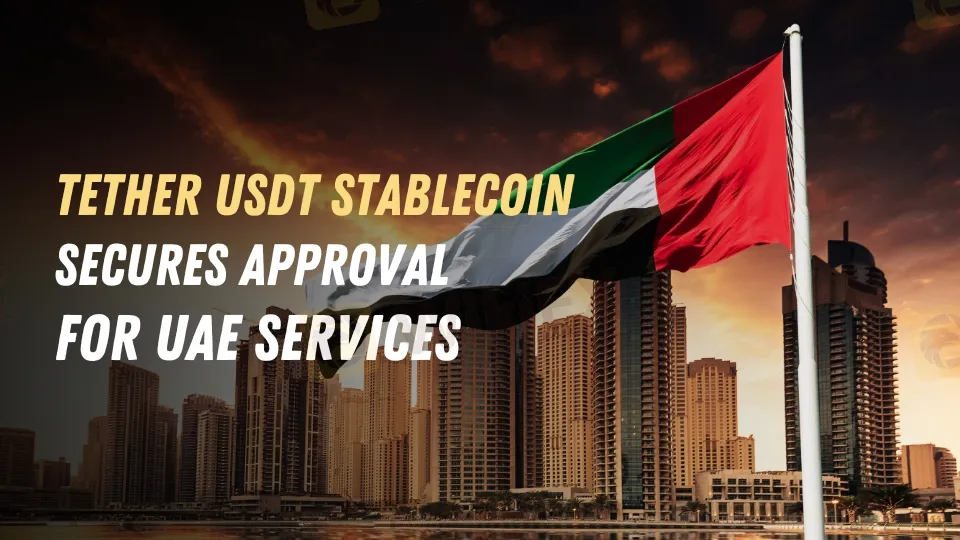简体中文
繁體中文
English
Pусский
日本語
ภาษาไทย
Tiếng Việt
Bahasa Indonesia
Español
हिन्दी
Filippiiniläinen
Français
Deutsch
Português
Türkçe
한국어
العربية
Tether USDT Stablecoin Secures Approval for UAE Services
Abstract:Abu Dhabi Global Market grants Tether’s USDt stablecoin full recognition for regulated services, enabling licensed firms in the region to offer USDt services.

Tether's USDt stablecoin, the biggest stablecoin by market value with over $138 billion, has gotten a huge boost in the UAE. The Abu Dhabi Global Market (ADGM) has formally recognized USDt as an Accepted Virtual Asset (AVA), allowing regulated enterprises operating within its jurisdiction to provide stablecoin-related services. This clearance is a significant milestone in Tether's growth and expansion in the Middle East, where the crypto-friendly regulatory climate continues to attract key participants in the digital asset market.
USDt's Rising Influence on Blockchains
USDt's accreditation is critical since the stablecoin has already been accepted for use on key blockchains like Ethereum, Solana, and Avalanche. USDt's broad blockchain interoperability assures widespread adoption for a variety of use cases, ranging from trading to decentralized finance (DeFi) applications, providing stability in unpredictable cryptocurrency markets. Tether's position as the largest stablecoin issuer by market size provides it a distinct advantage in the global crypto ecosystem.
Tether to Add New Dirham-Pegged Stablecoin to Its Portfolio
Tether has announced agreements with Phoenix Group and Green Acorn Investments to establish a dirham-pegged stablecoin, further solidifying its leadership in the digital asset market. This new product will join Tether's existing stablecoins, which include USDT and EURT, broadening its stable asset portfolio. The UAE's dirham-pegged stablecoin will be created to meet local demand for a stable digital asset backed by the UAE's national currency, hence improving market access for investors and traders.

Tether's foray into the dirham-pegged market is strategically significant. It not only meets rising demand in the UAE but also reinforces the company's position as a worldwide leader in the stablecoin field.
UAE's Crypto-Friendly Regulatory Environment
The UAE has made tremendous progress in establishing itself as a cryptocurrency center, drawing large global businesses such as OKX, which opened retail and institutional trading platforms in the area. In addition to Tether's acceptance, the UAE has demonstrated significant governmental backing for digital assets. M2 Exchange, for example, has implemented a system that allows locals to transfer dirhams straight into Bitcoin (BTC) and Ether (ETH).
The acceptance of USDt is consistent with the UAE's overarching goal of becoming a cryptocurrency market leader. The UAE Central Bank recently gave in-principle clearance to AED Stablecoin, a dirham-pegged stablecoin operating under the Payment Token Service Regulation framework. The move is viewed as a forerunner to AED Stablecoin being the first fully regulated dirham-backed stablecoin in the UAE.
Challenges and the Future of Crypto Payments
The Central Bank of the UAE's (CBUAE) regulatory framework has also spurred debate over the country's future use of cryptocurrency payments. The framework restricts the use of crypto for payments unless they incorporate licensed dirham-pegged tokens. If accepted, AED Stablecoin's AE Coin may become a local trading pair for cryptocurrencies on exchanges and decentralized platforms, letting retailers accept it as payment for products and services.
The growth of regulated stablecoins such as AED Stablecoin, together with the rising acceptability of Tether's USDt, indicates that digital currencies are becoming more widespread in the area.
Final Thoughts:
Tether's acceptance in the UAE is a significant step toward expanding into the Middle Eastern market. As the area adopts stablecoins and blockchain technology, Tether's decision to introduce a dirham-pegged stablecoin, together with its strong regulatory presence in the UAE, points to a bright future for the firm. Furthermore, the UAE's aim to create a safe, strong financial ecosystem for both traditional and digital assets is supported by the use of regulated crypto assets. With a growing interest in fiat-pegged stablecoins, the UAE's crypto-friendly climate is primed to attract further investment and innovation.

Disclaimer:
The views in this article only represent the author's personal views, and do not constitute investment advice on this platform. This platform does not guarantee the accuracy, completeness and timeliness of the information in the article, and will not be liable for any loss caused by the use of or reliance on the information in the article.
Read more

Rising WhatsApp Scams Highlight Need for Stronger User Protections
UK consumers lose £2,437 on average to WhatsApp scams. Revolut demands stricter verification and AI monitoring to combat rising fraud on Meta platforms.

Interactive Brokers Launches Forecast Contracts in Canada for Market Predictions
Interactive Brokers introduces Forecast Contracts in Canada, enabling investors to trade on economic, political, and climate outcomes. Manage risk with ease.

Georgia Man Charged in Danbury Kidnapping and Crypto Extortion Plot
Georgia man James Schwab charged in Danbury kidnapping tied to $230M crypto heist. Plot targeted couple for ransom after Miami altercation with son.

Bybit Shuts Down NFT Marketplace Amid Crypto Market Downturn
Bybit announces the closure of its NFT marketplace, citing efforts to streamline offerings. Discover the latest trends in the declining NFT market and its shift to utility-based growth.
WikiFX Broker
Latest News
The Withdrawal Trap: How Scam Brokers Lure Victims into Paying More
FCA to Investors: Think Twice Before Trusting These Brokers
Trump\s tariffs: How could they affect the UK and your money
Trump gambles it all on global tariffs he\s wanted for decades
TradingView Brings Live Market Charts to Telegram Users with New Mini App
Trump tariffs: How will India navigate a world on the brink of a trade war?
Interactive Brokers Launches Forecast Contracts in Canada for Market Predictions
IG Group Acquires Freetrade for £160M to Expand UK Investment Market
U.S. March ISM Manufacturing PMI Released
Should You Beware of Forex Trading Gurus?
Currency Calculator







